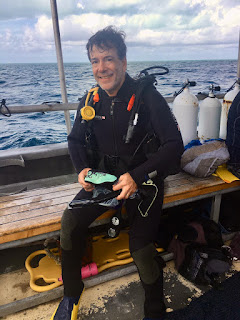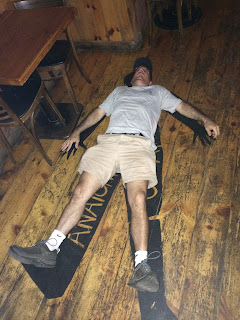Today we spotlight our final author from Dark Matter: Artificial! We've asked him to share a little about how he came up with his story and preview what's to come!
I’m a journalist as well as a novelist, and many of my journalism colleagues become very amused when they discover that I majored in astrophysics in college. An Associated Press photographer once took me aside and said, “Listen, your new nickname is Astro, okay? Because that’s what all of us have been calling you ever since we found out.”
I chose to study astrophysics at Princeton University because I thought it was the most poetic of the sciences. It explores and explains some of the most beautiful objects in the universe, the stars and planets and nebulae and galaxies that still fill me with wonder whenever I gaze at the night sky. Even more romantic, astrophysics is full of mysteries. Is the universe infinite? Did it have a beginning? Why are its laws mathematical, and do they have a purpose? Why is there something instead of nothing?
Dark matter was one of the great mysteries confronting astrophysicists in the 1980s when I was at Princeton. Just a decade before, astronomer Vera Rubin had painstakingly observed the rotation rates of dozens of galaxies, which were spinning much faster than anyone had thought possible. The best explanation, Rubin concluded, was that each galaxy was embedded in a huge cloud of invisible matter that vastly outweighed all of the galaxy’s stars, gas, and dust. But despite a half-century of diligent searching since then, astronomers have failed to detect even a smidgeon of this dark matter. Mysterious, right?
When I started writing novels fifteen years ago, I focused on scientific mysteries. Albert Einstein, the enigmatic founder of modern physics, was the subject of my internationally bestselling first novel, Final Theory, which was published by Simon & Schuster in 2008, optioned for film, and translated into two dozen languages. My third novel, Extinction (St. Martin’s Press, 2013), scrutinized the mystery of consciousness, while my ninth novel, The Coming Storm (St. Martin’s, 2019), explored the puzzles of climate change and genetic engineering. So, it was a special pleasure for me to return to the mystery of dark matter by writing a short story for this anthology.
Vera Rubin died in 2016 at an assisted-living facility in Princeton, N.J. I thought it would be interesting to imagine her still wrestling with the dark matter problem at the end of her life, so that’s the premise of my story. In her last hours Vera envisions the entire history of the universe, stretching ahead to the far future, and she compares dark matter to God. Dark matter, like many common conceptions of God, is ubiquitous and played a vital role in creating the universe as we know it. What’s more, we haven’t been able to directly detect dark matter, and yet we sense its gravitational presence. It’s an interesting comparison, but I can’t really take credit for it; the Vera Rubin character inside my head explained the idea to me, and I just wrote it down. Thank you, Vera!
 |
| Mark strikes a Sea Hunt pose during a scuba expedition near Heron Island in Australia’s Great Barrier Reef. |
 |
| Mark at a book signing for The Siege, one of his Young Adult novels, at Books of Wonder in NYC. |
 |
| Mark reenacting the murder made famous in Anatomy of a Murder at the Lumberjack Tavern in Big Bay, Michigan. |
 |
| Mark is hard at work on his next novel! Go to www.markalpert.com to see excerpts and buy links for all his books. |
Blurb:
Mark Alpert’s short story, “Vera’s Last Voyage,” imagines the final moments in the life of the late Vera Rubin, the brilliant astronomer who discovered the best evidence for dark matter but never got the full credit she deserved, partly because of sexism.
Excerpt:
I turn back to the elliptical galaxy. Bob has evidently ratcheted up the pace of cosmic history, and now quadrillions of years are zipping by in an instant. All the white dwarf stars have cooled into black dwarfs, charred cinders of high-density matter, utterly frigid and dead. All the largest stars have collapsed and become black holes, which revolve unseen around the monstrous hole at the galaxy’s center. The only fireworks happen when two stellar remnants collide and spark a supernova, or when two black holes get too close to each other and merge with a spacetime-shaking clang. But those collisions occur less and less often as time goes on. For untold eons, the universe does nothing exciting. It’s dark and silent and very, very boring.
Thinking about it makes me shudder. If the universe were a person, it would spend just a tiny fraction of a second going through all the active phases of life—childhood, adolescence, adulthood, the golden years. And then it would spend billions of millennia lying on a bed in an assisted-living facility, doing nothing at all. Why does it take so long to die?
Mark Alpert is the internationally bestselling author of 10 science fiction novels. He first heard about dark matter while studying astrophysics at Princeton University, and he learned much more about the subject while working as an editor at Scientific American during the 1990s and 200s. His first novel, Final Theory (Simon & Shuster, 2008), was published in 24 languages, optioned for film, and condensed for Reader's Digest. His Young Adult novel, The Six (Sourcebooks, 2015), was nominated for the Nutmeg, Beehive, and Cybils awards. His tenth and latest novel is Saint Joan of New York: A Novel About God and String Theory. Learn more at: http://www.markalpert.com/


4 comments:
Interesting and varied career path. I think Vera would've appreciated your story, Mark.
Thanks! I never met Vera Rubin in person, but I’ve talked with many astrophysicists who knew her well.
Thanks! I never met Vera Rubin in person, but I’ve talked with many astrophysicists who knew her well.
Thanks! I never met Vera Rubin in person, but I’ve talked with many astrophysicists who knew her well.
Post a Comment